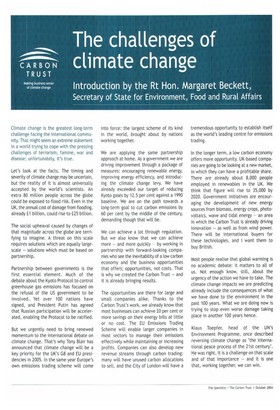Climate change is the greatest long-term challenge facing the international
community. That might seem an extreme statement in a world trying to cope with the pressing challenges of terrorism, famine, war and disease; unfortunately, it's true.
Let's look at the facts. The timing and severity of climate change may be uncertain, but the reality of it is almost universally accepted by the world's scientists. An extra 80 million people across the globe could be exposed to flood risk. Even in the UK, the annual cost of damage from flooding, already El billion, could rise to E25 billion.
The social upheaval caused by changes of that magnitude across the globe are terrifying to imagine. A threat on this scale requires solutions which are equally largescale — solutions which must be based on partnership.
Partnership between governments is the first essential element. Much of the debate about the Kyoto Protocol to control greenhouse gas emissions has focused on the refusal of the US government to be involved. Yet over 100 nations have signed, and President Putin has agreed that Russian participation will be accelerated, enabling the Protocol to be ratified, But we urgently need to bring renewed momentum to the international debate on climate change. That's why Tony Blair has announced that climate change will be a key priority for the UK's G8 and EU presidencies in 2005. In the same year Europe's own emissions trading scheme will come into force: the largest scheme of its kind in the world, brought about by nations working together.
We are applying the same partnership approach at home. As a government we are driving improvement through a package of measures: encouraging renewable energy, improving energy efficiency, and introducing the climate change levy. We have already exceeded our target of reducing Kyoto gases by 12.5 per cent against a 1990 baseline. We are on the path towards a Long-term goal to cut carbon emissions by 60 per cent by the middle of the century, demanding though that will be.
We can achieve a tot through regulation. But we also know that we can achieve more — and more quickly — by working in partnership with forward-looking companies who see the inevitability of a low carbon economy and the business opportunities that offers; opportunities, not costs. That is why we created the Carbon Trust — and it is already bringing results.
The opportunities are there for large and small companies alike. Thanks to the Carbon Trust's work, we already know that most businesses can achieve 20 per cent or more savings on their energy bills at little or no cost. The EU Emissions Trading Scheme will enable larger companies in most sectors to manage their emissions effectively while maintaining or increasing profits. Companies can also develop new revenue streams through carbon trading: many will have unused carbon allocations to sell, and the City of London will have a tremendous opportunity to establish itself as the world's Leading centre for emissions trading.
In the longer term, a low carbon economy offers more opportunity. UK-based companies are going to be looking at a new market, in which they can have a profitable share. There are already about 8,000 people employed in renewables in the UK. We think that figure will rise to 35,000 by 2020. Government initiatives are encouraging the development of new energy sources from biomass, energy crops, photovoltaics, wave and tidal energy — an area in which the Carbon Trust is already driving innovation — as well as from wind power. There will be international buyers for these technologies, and I want them to buy British.
Most people realise that global warming is no academic debate: it matters to all of us. Not enough know, still, about the urgency of the action we have to take. The climate change impacts we are predicting already include the consequences of what we have done to the environment in the past 100 years. What we are doing now is trying to stop even worse damage taking place in another 100 years hence.
Klaus Toepfer, head of the UN's Environment Programme, once described reversing climate change as 'the international peace process of the 21st century'. He was right. It is a challenge on that scale and of that importance — and it is one that, working together, we can win.


















































































































 Previous page
Previous page